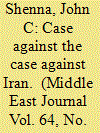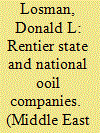| Srl | Item |
| 1 |
ID:
097881


|
|
|
|
|
| Publication |
2010.
|
| Summary/Abstract |
Iran's leaders have reasons for spurning Western offers of engagement over Iran's nuclear program. They cannot so easily spurn approaches from Turkey and Arab neighbors. Regional engagement should therefore be encouraged, especially by Russia and China, to build confidence in Iran's intention to respect its core Nuclear Non-Proliferation Treaty (NPT) obligation and reduce anxieties that could prompt a regional nuclear arms race. Furthermore, a more rigorous threat analysis suggests Israel can afford to be restrained.
|
|
|
|
|
|
|
|
|
|
|
|
|
|
|
|
| 2 |
ID:
097882


|
|
|
| 3 |
ID:
097885


|
|
|
|
|
| Publication |
2010.
|
| Summary/Abstract |
While the concept of the rentier state is common knowledge to Middle East scholars, very little has been written concerning the basic support and revenue tool for such states - the national oil companies. This article examines the micro-economic, financial, and managerial behavior of national oil companies, assesses their economic efficiency, and relates their operations to rentier state politics.
|
|
|
|
|
|
|
|
|
|
|
|
|
|
|
|
| 4 |
ID:
097883


|
|
|
|
|
| Publication |
2010.
|
| Summary/Abstract |
This article examines the dynamics of autocracy in Yemen through the lens of elite bargaining and decision-making inside networks of patronage. It identifies the informal rules of inclusion, exclusion, rewards, and punishments that guide elite behavior and traces changing patterns of patronage distribution since 1994. In doing so, it provides insights into the survival of the Yemeni autocracy, the obstacles to reform, and potential opportunities to avert an impending crisis.
|
|
|
|
|
|
|
|
|
|
|
|
|
|
|
|
| 5 |
ID:
097884


|
|
|
|
|
| Publication |
2010.
|
| Summary/Abstract |
This article explores the economic development of Yemen after the 1970s in order to identify and analyze the variables that have contributed to its near collapse. It will be argued that the structural changes that took place in the Yemeni economy, particularly over the twenty-year period between 1970-1990, created a unique development experience that, once it collapsed due to the Gulf Crisis of 1990, left the majority of Yemenis with little means of survival. Moreover, it is argued that the structure of the Yemeni economy (which had been based on sustaining labor migration) could not and would not adapt to the changing circumstances. Furthermore, Yemen continues to survive on the substitution of revenue from oil rents for the revenue from labor migration. These rents from oil have not trickled down to the vast majority of Yemenis that had come to rely on labor migration rents either directly or indirectly for over two decades. These revenues significantly shifted the economic base away from the general population and narrowed it to a few individuals associated with the government. Although there have been attempts to restructure the economy with the assistance of international agencies, Yemen's economy remains underdeveloped and appears ready to collapse under the burden of unemployment, poverty, and rapid population growth.
|
|
|
|
|
|
|
|
|
|
|
|
|
|
|
|